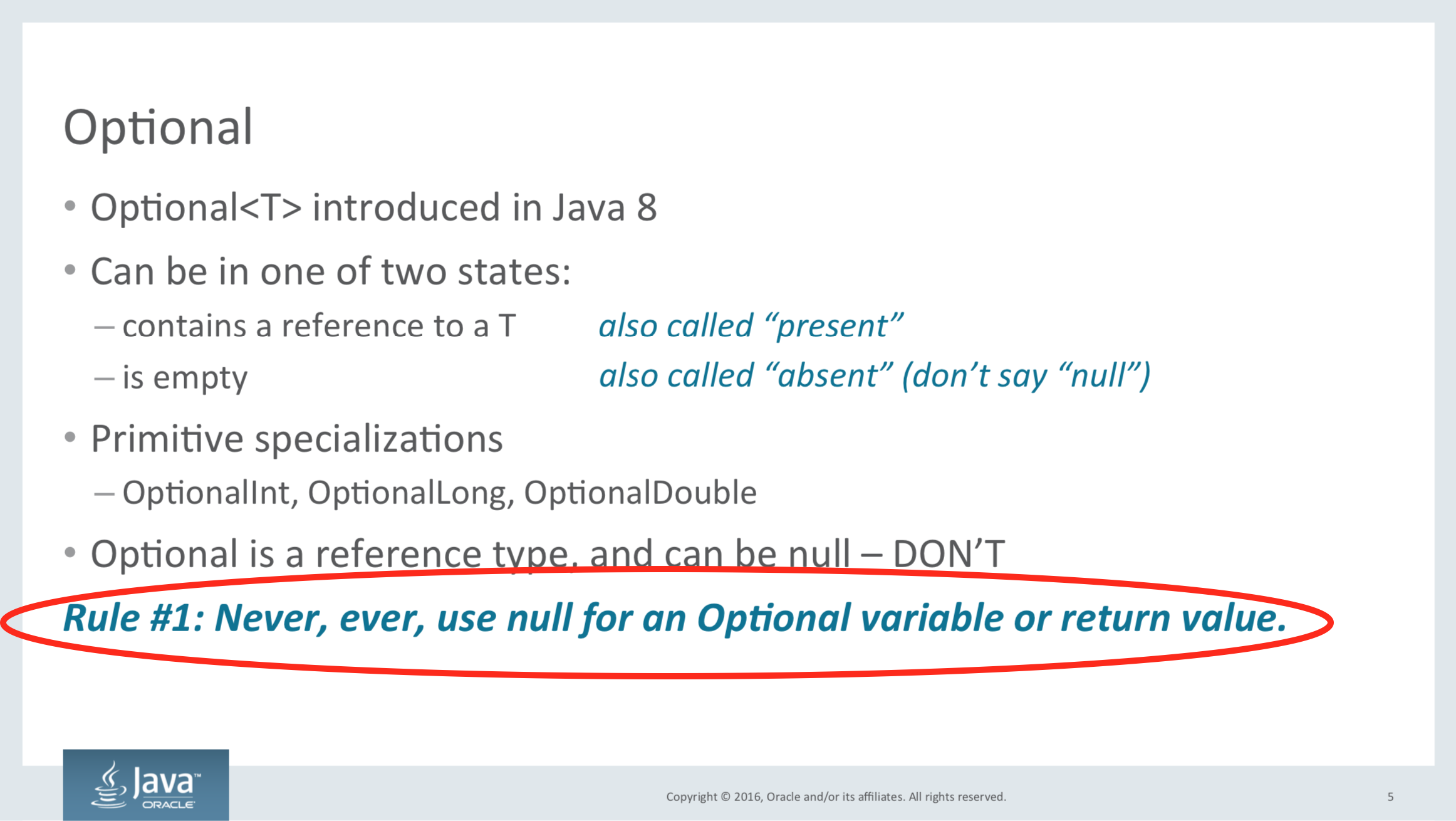Optionals were introduced to Java in version 8.
Prior to it, when we had no value to return from a method, we could for example return a null or throw an exception.
Both options have their drawbacks.
If the calling code forgets to check the return value for null, there’s a high chance for a NullPointerException to happen down the line.
Throwing an exception also does not feel right.
The fact that a value is missing isn’t always an exceptional situation.
Java’s Optional has been criticised for its flaws but despite that I personally find them tremendously useful.
Over the years, however, I’ve also seen code where I think the Optional type has been misused.
The following is a list of misuses of Optional and what you can do to avoid them.
1. Returning null from an Optional-returning method
When you see that a method returns an Optional of something, this is a clear indication that the method signature is trying to tell you that the return value might be missing.
The good thing about Optionals is that they force you to handle the special case where there might be no value.
Since Optionals are designed so that we don’t have to explicitly deal with null references anymore, returning a null from an Optional-returning method will definitely throw somebody off guard.
Most of us don’t expect the Optional container itself to be null.
Returning a null from an Optional-returning method means that we have to handle two special cases - null reference and empty Optional.
In Effective Java, the author Joshua Bloch writes
Never return a null value from an Optional-returning method: it defeats the entire purpose of the facility.
Stuart marks gave a presentation about Optionals for vJUG where he emphasised to never, ever, use null for an Optional variable or return value.

Make sure that the method responsible for returning the Optional never returns null.
Make use of Optional.empty() instead.
2. Checking whether an Optional is null
Checking whether a variable of type Optional is null is related to the previous misuse.
If we write code that ensures an Optional can never be null, then there’s no need to check for null references.
It saves us from cluttering our code with unnecessary null checks.
If, however, you find yourself in a situation where an Optional for some reason is null, refer back to the previous paragraph.
Handling two special cases—null reference or an empty Optional—defeats the entire purpose of using Optionals.
To put it differently, adding an extra layer of indirection in the form of an Optional container but reaping none of its benefits is worse compared to not using Optionals at all.
If you use SonarQube or have the SonarLint plugin for your IDE, checking an Optional variable for null results in the following bug report.
The concept of Optional is that it will be used when
nullcould cause errors. In a way, it replacesnull, and when Optional is in use, there should never be a question of returning or receivingnullfrom a call.
To conclude, make sure a variable whose type is Optional is never null.
3. Using Optional as a method parameter
Java language doesn’t have optional method parameters but one might think that we could implement it using Optional.
Let’s have a look at the following method declaration.
public void greet(Optional<String> name) {
System.out.println("Hello " + name.orElse("world"));
}
Seems nice and succinct, right?
Well, the method body is a beautiful one-liner but let’s quickly look at how callers should invoke the greet method.
greet(Optional.of("neighbor"));
// prints "Hello neighbor"
greet(Optional.empty());
// prints "Hello world"
Callers must always wrap every argument with an Optional or pass an empty Optional.
A simpler approach would be to use overloaded methods instead.
public void greet(String name) {
System.out.println("Hello " + name);
}
public void greet() {
greet("world");
}
Callers can simply pass in the string without having to do any additional wrapping.
greet("neighbor");
// prints "Hello heighbor"
greet();
// prints "Hello world"
But let’s say we were not trying to implement optional parameters.
We just have an Optional at hand and want to pass it to another method for further processing, would that be okay?
Optional<Customer> customer = ... // get a customer object
process(customer);
There’s nothing stopping you from doing that but perhaps we can do better?
If we think about, what would happen inside the process method?
Most likely it would try to unwrap the Optional and do something with the underlying Customer.
If that’s the case, a more elegant solution would be to make use of the ifPresent method on the Optional class and pass it a lambda expression or a method reference.
Optional<Customer> customer = ...
customer.ifPresent(this::process);
Java Language Architect Brian Goetz had the following to say in an answer to a question about Optionals on Stack Overflow.
You should almost never use it as a field of something or a method parameter.
4. Getting a value from Optional without making sure it’s present
Getting the value from the Optional container seems trivial.
Just use the get() method.
But if we look more closely at the documentation, we can see that it throws a NoSuchElementException when the Optional is empty.
By just reading the method name it seemed like a safe operation but it’s not.
Before calling get(), we must make sure the Optional has a value inside.
Brian Goetz wrote the following in a popular Stack Overflow answer.
NEVER call
Optional.getunless you can prove it will never benull; instead use one of the safe methods likeorElseorifPresent. In retrospect, we should have called get something likegetOrElseThrowNoSuchElementExceptionor something that made it far clearer that this was a highly dangerous method that undermined the whole purpose of Optional in the first place. Lesson learned.
There were even talks about deprecating Optional::get in OpenJDK mailing list but the idea was not well received.
Java 10 introduced a new overloaded method for Optional::orElseThrow without any parameters.
The behaviour of this method is the same as for Optional::get but the name is more appropriate.
Therefore, before calling get you must prove that an Optional has a value with isPresent.
Optional<String> optional = ...
if(optional.isPresent()) {
String str = optional.get();
}
On the other hand, this approach is hardly an improvement compared to checking for nulls. Compare it with the following code.
String str = ...
if (str != null) {
// do something with str
}
The structure is the same.
We first check, then act.
The problem with Optional::get is that it leads us to write the same style of code that we wrote when we explicitly checked for null references.
That invites an obvious question, what’s the benefit of Optionals then?
Instead of using Optional::get, most of the time we can create a more elegant solution by using alternative methods on the Optional class (map, filter, ifPresent, orElse).
To put it differently, if possible, try to avoid using isPresent.
5. orElse(null)
orElse method on the Optional class can be used to provide a fallback value when the Optional is empty.
In some situations you might want to continue working with null references.
Let’s say that you already have some code or use a library that expects to receive a nullable reference and can deal with the null case.
In these situations we can let the fallback value be null.
// findUserById returns an Optional<User>
User user = findUserById(1L).orElse(null);
Other than that, I would try to avoid orElse(null).
Usually there’s a more elegant way to solve the problem.
Imagine that you used orElse(null) and now have a reference to a User object that might be null.
Whenever you start to call any methods on the user, you would first have to check that the reference is not null.
User user = findUserById(1L).orElse(null);
if (user != null) {
// do something with the user
}
In my humble opinion, using ifPresent in this case would be better.
Optional<User> user = findUserById(1L));
user.ifPresent(/* lambda expression or method reference */);
6. Collections wrapped with an Optional
We’ve learned so far that Optionals can be used to model the absence of a result from a computation.
Let’s say we have a method that returns a List of User objects from a database.
Let’s also introduce a limitation that in some situations the database might not contain any users.
One might think that this special case can be modelled with an Optional.
public Optional<List<User>> fetchUsersFromDatabase() {
...
}
Callers of the method can see from the return type that the value might be missing and can handle the special case. Pretty nifty, eh? No. Not really. Don’t do that!
This is an example of going too far with Optionals. Absence of values can also be represented with an empty collection. Introducing Optionals to the mix only complicates things. What you would end up is a container inside a container, like a Matryoshka doll.

The book Effective Java mentions the following:
Container types, including collections, maps, streams, arrays, and optionals should not be wrapped in optionals.
7. Optional as an element in a collection
We just looked at that there’s no real benefit in wrapping a collection type with an Optional.
What about the other way around?
What if we have a collection of Optional types?
List<Optional<Cat>> users = ... // fetch cats
When we have a list of cat objects, most likely we’re going to iterate trough them and do something with each element.
But if each element is an Optional, we would first have to unwrap it and process it only when it is present.
A much simpler approach would be to not include Optionals in collection types at all and keep our collections clean of Schrödinger’s cats—cats that are simultaneously both there and not until we check for their presence.

I’m going to reference Effective Java for the last time in this post.
… it is almost never appropriate to use an optional as a key, value, or element in a collection or array
Summary
The introduction of Optionals to Java got some flak from the community.
Some might think that Optional is a first-class option type integrated into the language.
It does not help that during the design phase there were different opinions about what Optional should and shouldn’t be.
From JavaSE 11 documentation we can read that Optional is primarily intended for use as a method return type. In addition, Java language architect Brian Goetz wrote the following in a Stack Overflow answer.
Of course, people will do what they want. But we did have a clear intention when adding this feature, and it was not to be a general purpose Maybe type, as much as many people would have liked us to do so. Our intention was to provide a limited mechanism for library method return types where there needed to be a clear way to represent “no result”, and using null for such was overwhelmingly likely to cause errors.
The main takeaway form this post should be that Optionals don’t replace nulls and don’t provide 100% null safety. Going far and beyond, trying to avoid nulls by using Optionals in places where it was not designed to be used could result in some cumbersome looking code. Your milage may vary though.

